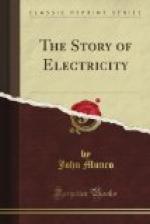In securing the necessary right of way for the hydraulic tunnel or in the acquisitom of land, the Company has shown consummate tact. A few proprietors declined to accept its terms, and the Company selected a parallel route. Having obtained the right of way for the latter, it informed the refractory owners on the first line of their success, and intimated that the Company could now dispense with that. On this the sticklers professed their willingness to accept the original terms, and the bargain was concluded, thus leaving the Company in possession of the rights of way for two tunnels, both of which they propose to utilise.
The liberal policy of the directors is deserving of the highest commendation. They have risen above mere “chauvinism,” and instead of narrowly confining the work to American engineers, they have availed themselves of the best scientific counsel which the entire world could afford. The great question as to the best means of distributing and applying the power at their command had to be settled; and in 1890, after Mr. Adams and Dr. Sellers had made a visit of inspection to Europe, an International Commission was appointed to consider the various methods submitted to them, and award prizes to the successful competitors. Lord Kelvin (then Sir William Thomson) was the president, and Professor W. C. Unwin, the well-known expert in hydraulic engineering, the secretary, while other members were Professor Mascart of the Institute, a leading French electrician; Colonel Turretini of Geneva, and Dr. Sellers. A large number of schemes were sent in, and many distinguished engineers gave evidence before the Commission. The relative merits of compressed air and electricity as a means of distributing the power were discussed, and on the whole the balance of opinion was in favour of electricity. Prizes of two hundred and two hundred and fifty pounds were awarded to a number of firms who had submitted plans, but none of these were taken up by the Company. The impulse turbines of Messrs. Faesch & Piccard, of Geneva, who gained a prize of two hundred and fifty pounds, have, however, been adopted since. It is another proof of the determination of the Company to procure the best information on the subject, regardless of cost, that Professor Forbes had carte blanche to go to any part of the world and make a report on any system of electrical distribution which he might think fit.
With the selection of electricity another question arose as to the expediency of employing continuous or alternating currents. At that time continuous currents were chiefly in vogue, and it speaks well for the sagacity and prescience of Professor Forbes that he boldly advocated the adoption of alternating currents, more especially for the transmission of power to Buffalo. His proposals encountered strong opposition, even in the highest quarters; but since then, partly owing to the striking success of the Lauffen to Frankfort experiment in transmitting power by alternating




